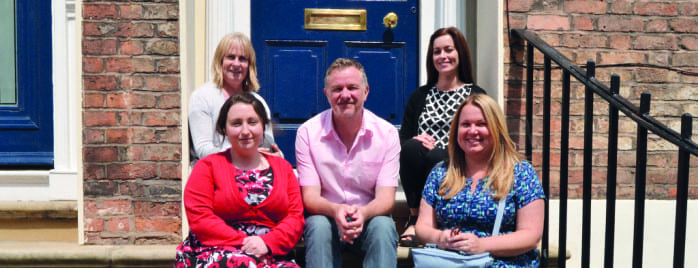November 23, 2015
The people who use our services drive what we do: The Wellbeing Centres
‘The knowledge and experiences of people who use our services should be recognised as an asset’- Nicky McGovern, Wellbeing Centres Service Manager tells us more about how her team (pictured) have engaged the people who use their services in a new and exciting way.
‘Service user involvement is full of so many thorny issues, it always seems to be a work in progress. Writing this has allowed me as a service manager to reflect on my own changing relationship with service users.
I believe that changing our relationships and attitudes towards service users is just as important for service user involvement as developing policies and procedures.
Over the last 7 or so years there has been a major culture shift at our Wellbeing Centres. The relationship between staff and service users used to be very much ‘them and us’ Staff as experts and service users with needs. Staff teaching service users how the way they were thinking was wrong and ways to feel better. Though teaching people ways to feel better is not such a bad thing, it all looked and felt very ‘text book’.
Contrast this with my own experience. My first day as a project worker at the Umbrella Centre, I had no specialist mental health knowledge and only a social work qualification to my name. 13 years later I am proud to say that all I know about mental health, I have learned from service users who have shared their experience with me. From each of their personal recovery stories.
So my own professional journey within mental health has convinced me that the knowledge and experiences of people who use our services should be recognised as an asset. It is a real wealth within all our services and too often it goes untapped.
Our service has gradually moved away from ‘them and us’ Our fantastic team of staff and service users share responsibility for course delivery and deciding what should be provided.
This hasn’t been an easy journey, we as staff needed to accept that they don’t always know best and service users no longer could get away with just telling us where we are going wrong. A joint approach is now expected.
So what do we do differently now?
We have developed a peer support pathway as a vehicle for promoting involvement and co-production.
In order for service users to have the skills and confidence to contribute at meetings and deliver courses, we worked in partnership with The Basement, a local organisation that offered free peer mentoring courses.
Over the last 5 years 42 service users have gained an accredited qualification, some moving on to paid employment outside of PSS.
As a progression we developed the role of volunteer peer support worker within the service. Peer support workers oversee a variety of groups at the centres some are conversational groups others are activity based
Here’s what they currently deliver:
Tom* leads Yoga sessions
Janet co-facilitates a reading group
Jenna leads the womens group
Darren leads the mens group
Phil leads on digital involvement.
Karen leads a singing group
Phillip leads PSS Creatives
Sandra leads art journaling sessions
Mike, Emily and Dean lead Culture Vultures
If we go back to service users as assets not just of needs I would like to concentrate on Phil for a minute.
The 1st line of Phil’s referral to the service said: Client is struggling with low mood, is isolating himself and finding it difficult to motivate himself .
18 months later and Phil is a much valued volunteer and colleague not only of our service he also volunteers for the CAB, Sahir House and is a trustee of Liverpool Mental Health Consortium
Our new approach has achieved positive outcomes not just for Phil but for all the services he now volunteers for. Within these services he is most certainly valued as an asset.
This year we have stepped up a gear regarding involving service users. We have employed a Service User Representative who works 2hrs per week on a sessional basis.
We have always held service user forums at the centres, but that is where involvement in decision making stopped. This year we made the leap and recruited a service user representative to represent the service user voice in team meetings.
Having a service user at team meetings has been a massive culture change for the team. It is something we always knew was the right thing to do but concerns regarding confidentiality issues always acted as a barrier. This year we were brave and took the leap and confidentiality has not been such an issue.
To minimise risk we recruited someone who had used the service within the last 6 months and had moved on. We employed Emily, who has spent the last year meeting with all the groups completing a survey and writing a report on Peer Support.
Again this has positive outcomes for all involved not just Emily as it not only helps us improve the quality of Peer Support but also will be valuable evidence for future funding bids.
Lastly I want to tell you about Kindred Minds.
We have supported the development of Kindred Minds a user-led organisation. This year it was awarded £10,000 grant from Liverpool CCG to develop WellPool an online blog where people share what keeps them well. This is a massive achievement for Kindred Minds with those service users involved passionate about keeping it all going.
It’s not all about PSS supporting Kindred Minds either. Recently, Kindred Minds kindly agreed to fund a service user summer day out. I have also just written a proposal that they sponser the next PSS Creatives drama production. I am awaiting their decision with a wry smile on my face, what a role reversal! Who has the power now?’
Click here to view the Wellbeing centre’s Autumn/Winter Prospectus
*Some names may have been changed
Photo by Marc Fraser

